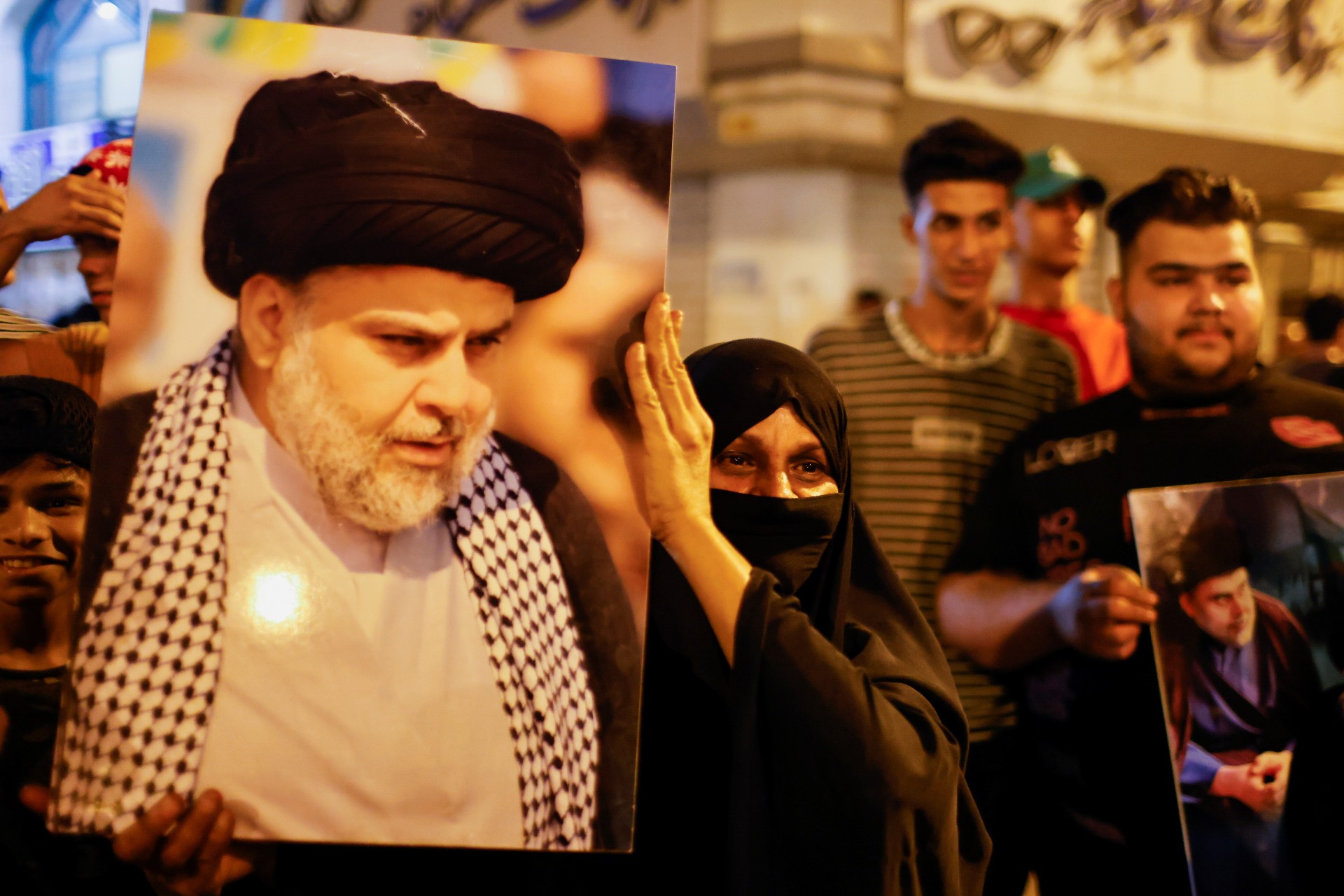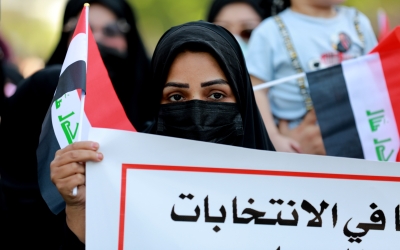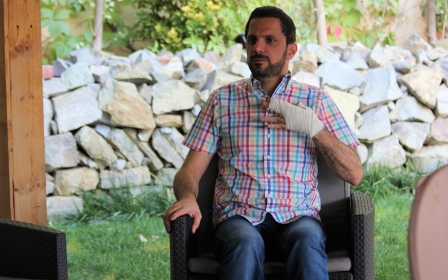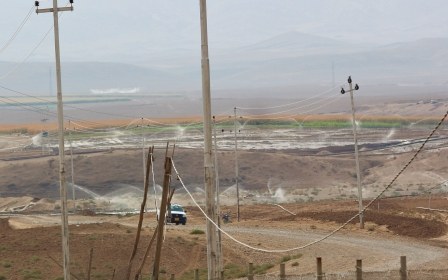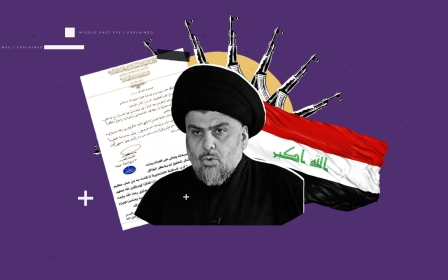Iraq elections: As Sadr seeks full control, Maliki woos his bruised opponents
Iraq’s October elections have sharply redrawn the Shia forces’ map of influence, and heated up the rivalry between Muqtada al-Sadr, the polls’ clear winner, and Nouri al-Maliki, the former prime minister.
Sadr, a Shia cleric with millions of followers and a large armed group, emerged from the elections head and shoulders above his rivals. Sadr’s Sairoon Alliance won 74 seats, with Maliki’s State of Law list coming in second with 35.
The cleric’s opponents in the Iran-backed armed factions cobbled together around only 20 seats overall. And they have not taken it well.
Since the results became clear, supporters of the Iran-backed factions have staged sit-ins outside Baghdad’s fortified Green Zone, rejected the tallies and demanded votes be manually recounted. Hundreds of complaints have been lodged with the electoral commission.
'All of them, including Maliki, are afraid that Muqtada will swallow them up and swallow up the state, so they are looking for a way to restore things to their former status in one way or another'
- Senior Shia political leader close to Iran
But manual recounts will not be forthcoming except for a handful of polling stations, and the results are not expected to change significantly, Iraqi officials and politicians told MEE.
New MEE newsletter: Jerusalem Dispatch
Sign up to get the latest insights and analysis on Israel-Palestine, alongside Turkey Unpacked and other MEE newsletters
Sairoon is now the largest bloc in parliament. It has the exclusive right to nominate the next prime minister and form a government.
Naturally Sadr appears delighted, and has ignored the complaints of the bruised Iran-backed factions to plough on with government-formation negotiations, leaving those groups fearing the cleric seeks total dominance and their marginalisation.
Enter Nouri al-Maliki. The former prime minister has seized on these fears and is using them as leverage to give him a position of strength, officials, commanders of armed factions, politicians and observers told Middle East Eye.
"Everyone knows that recounting the votes manually is useless and the results will not change,” a senior Shia political leader close to Iran told MEE. He described the Iran-backed factions as being in an “unenviable position”. Once they were in control of the country and the extra-governmental powers, “but they have lost both now”.
"All of them, including Maliki, are afraid that Muqtada will swallow them up and swallow up the state, so they are looking for a way to restore things to their former status in one way or another.”
According to the political leader, the bruised armed factions are gathering around Maliki hoping he can act as a counterweight to Sadr, “but the scene is too complicated for things to be that simple”.
"The very large differences between the parties [in the Shia arena] that emerged from the recent elections make it very difficult to accept the traditional solutions that have prevailed over the past years."
Sadr's frightening project
Since 2006, Iraq has been governed using a power-sharing system that divvies up positions proportionally among the greatest winners in elections.
Though each of the last four elections has produced a standout winner, various parties have been folded into recent governments.
It is a system “that produced consensual governments from which everyone would benefit, but no one is responsible for their failure”, as a senior Sadrist leader described it to MEE.
“Sadr wants this to end, even if it costs him his life,” he said.
On Sunday, the cleric made his position official. "I believe that the first thing that should be done in the future for the homeland is [forming] a national majority government, so that we will have in parliament two parties: loyalists ... and opposition,” he said in a statement.
"Our project revolves around forming a government that we fully adopt and will take full responsibility for in case of success or failure. We are the ones who will choose the prime minister, form this government, and we will supervise its work,” the senior Sadrist leader said.
"This time, Sadr will not allow under any circumstances a return to playing in the grey zone. The government will be our government, and Sadr himself will follow up on all the details on a daily basis.”
The Sadrists, he claimed, will not blame others for any failures of the next government or prime minister. "Whoever wants to join us on this basis, is welcome."
The demand for full control of the new government has been seen by Sadr’s rivals such as Maliki, Ammar al-Hakim, leader of al-Hikma Movement, and former premier Haider al-Abadi as a “blatant breach” of the political norm that has preserved the supremacy of various political and armed forces since 2003.
Regardless of their electoral success, many political heavyweights in Iraq have been able to retain influence through the unofficial power-sharing system. But now Sadr is tearing up the rulebook, rivals and former partners alike are now denouncing his plans as a “coup” against them.
"They [Sadr's opponents] believe that accepting what the elections produced means an inevitable loss in the medium term, and therefore they must confront it now in an attempt to ensure their continuity and protection," a senior commander of an Iran-backed armed faction told MEE.
“They cannot confront Muqtada directly, neither politically because of the small number of their seats, nor militarily because this means the outbreak of inter-Shia fighting, so they resorted to Maliki,” he added.
"On the other hand, he [Maliki] also needs them to confront Muqtada, and to re-market himself as the saviour of the armed factions and Shia.”
Return to the top
Maliki, who rose to the premiership as a compromise candidate in 2006, grew in strength over his eight years in office, until the corruption, nepotism and sectarianism that flourished under his watch paved the way for the rise of Islamic State and the collapse of Iraq’s military in 2014.
That proved the end for Maliki’s premiership. But in opposition he used his know-how, contacts and prestige to gather Sadr’s opponents around him in an attempt to “erase his defeat and restore his lost throne, by forming an alliance equal to or greater than Sadr's alliance," a Shia politician said.
Though some have accused Sadr’s opponents of trying to cancel the elections and create a security crisis, one of Maliki’s advisors told MEE that the former premier instead is trying to develop the idea of "politically correcting the current situation".
"He does not seek the premiership. What he wants is to control the pace of the armed factions,” the advisor said.
'Maliki believes that he is the only one who is capable of containing the armed factions, so it is the time to present himself as a godfather and guide to the political process'
- Senior political leader close to Maliki
"These [armed factions] were subjected to an unexpected shock and are currently lost. They cannot go with Muqtada because they do not trust him, and they are not inclined to pursue the option of admitting their defeat and withdrawing,” he added.
"Political correction of the situation is the solution. A political agreement that preserves everyone's influence and provides them with the required protection can end the problem and satisfy all parties."
The political correction that al-Maliki proposes, according to a senior commander of powerful Shia armed faction Asaib Ahl al-Haq, is to return to consensus and form a government of “national participation”, meaning Sadr and Maliki’s camps come together. “So everyone returns to their homes, without problems,” the commander told MEE.
According to a senior political leader close to Maliki, he has weighed up his and Sadr’s strengths and weaknesses, and calculated the best way to approach the results is “to present himself as a saviour and protector for the losers”.
"The political process is rapidly heading towards obstruction. He wants to tell the international and domestic players that he still has a lot to do and the solutions to what has become of things must be through him,” he said.
“He believes that he is the only one who is capable of containing the armed factions, so it is the time to present himself as a godfather and guide to the political process, not as a prime minister, as some promote.
“Will he succeed in any of his endeavours? This is another issue."
Middle East Eye delivers independent and unrivalled coverage and analysis of the Middle East, North Africa and beyond. To learn more about republishing this content and the associated fees, please fill out this form. More about MEE can be found here.


